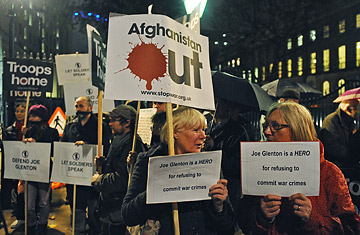
British demonstrators outside No. 10 Downing Street
Uncertainty is one of the most corrosive elements in politics, and as days melt into weeks with no firm decision from President Barack Obama on whether the U.S. will increase troop levels in Afghanistan, the remaining British consensus on the issue is threatening to dissolve. Public support for Britain's contribution to the NATO-led mission in Afghanistan has curdled as the body count of British troops has spiraled, reaching 98 this year alone. An opinion poll taken earlier this month after an Afghan policeman shot dead five British soldiers at a checkpoint in Helmand province revealed that three-quarters of the British public want U.K. forces to withdraw within a year.
During his annual foreign policy speech at London's Guildhall on Monday, Prime Minister Gordon Brown groped for a way to meet that aspiration by offering to host a conference involving NATO and the Afghan government in January to set out an Afghan exit strategy. The conference "should identify a process for transferring district by district to full Afghan control and — if at all possible — set a timetable for transfer starting in 2010," he said.
His speech did little to revitalize flagging public support. The British public is skeptical about the central tenet of Brown's policy that engagement in the region prevents terrorism on British streets. According to a survey taken Nov. 13-16 by politicshome.com, a news website, 44% of Westminster insiders agreed that the West's involvement in Afghanistan had helped combat global terrorism, but only 21% of respondents outside the Westminster bubble shared this view.
With elections fast approaching — Brown must go to the country at the latest by June 2010 and Westminster is abuzz with rumors of a March poll — public concerns are fomenting splits among the parties. Labour and its chief opponents, the Conservatives, remain committed to the NATO mission, but are trading blows over the treatment of troops and future defense investment plans. The Liberal Democrat leader Nick Clegg suggested in an article this summer that troops' "lives are being thrown away because our politicians won't get their act together," while two smaller parties, the Greens and the far-right British National Party, are demanding the immediate withdrawal of British troops.
Most exit strategies assume a more orderly withdrawal, in which NATO forces hand over control to Afghan authorities, whether district by district as Brown advocates or in larger increments. Yet the difficulties of training the notoriously volatile Afghan police force were highlighted by this month's Helmand checkpoint shooting (the dead soldiers had been mentoring the Afghan police) — and building up the Afghan army is only comparatively less problematic. A new report from the Berlin-based think tank SWP predicts that the Afghan National Army will reach its target level of 134,000 troops by 2011. But the report also highlights the difficulty of instilling a sense of collective responsibility in Afghan forces, citing the high level of equipment that is sabotaged or ends up on the black market.
Military commanders are aware of the challenges confronting members of the NATO mission which could include 500 additional British troops standing ready for deployment as early as the end of November, provided the Karzai government gives convincing assurances of its intention to tackle corruption — and assuming Washington finally arrives at a decision. On Nov. 16, Major-General Paul Newton, the Assistant Chief of Defense Staff, announced a new British counter-insurgency doctrine — the military's first in eight years —and said it needed to be swiftly implemented. "Does this sound to you like a briefing of the sort that you're perhaps used to, carefully scripted and modulated, from people who are suggesting to you that more of the same is going to be fine?" he asked rhetorically, adding: "There is a sense of urgency throughout the defense community."
Among the detailed guidelines in the manual and already in use by forces on the ground is a recommendation to pay local fighters not to join the enemy. "The best weapons to counter insurgents don't shoot," said Newton. "In other words, use bags of gold in the short term to change the security dynamics."
That may sound distasteful to a public more used to rhetoric about eradicating the Taliban, not buying them off. But if any new consensus is emerging around the Afghan mission in Britain, it is that hopes of a military solution have long evaporated. "Our goal is not a fight to the death. It is to demonstrate clearly that [the Taliban] cannot win, and to provide a way back into their communities for those who are prepared to live peacefully," said Britain's Foreign Secretary, David Miliband, in an address to the NATO assembly the same day British defense chiefs launched the new doctrine. Even as Britain prepares to boost its military presence, its political and defense establishment are acknowledging the limits of hard power.
